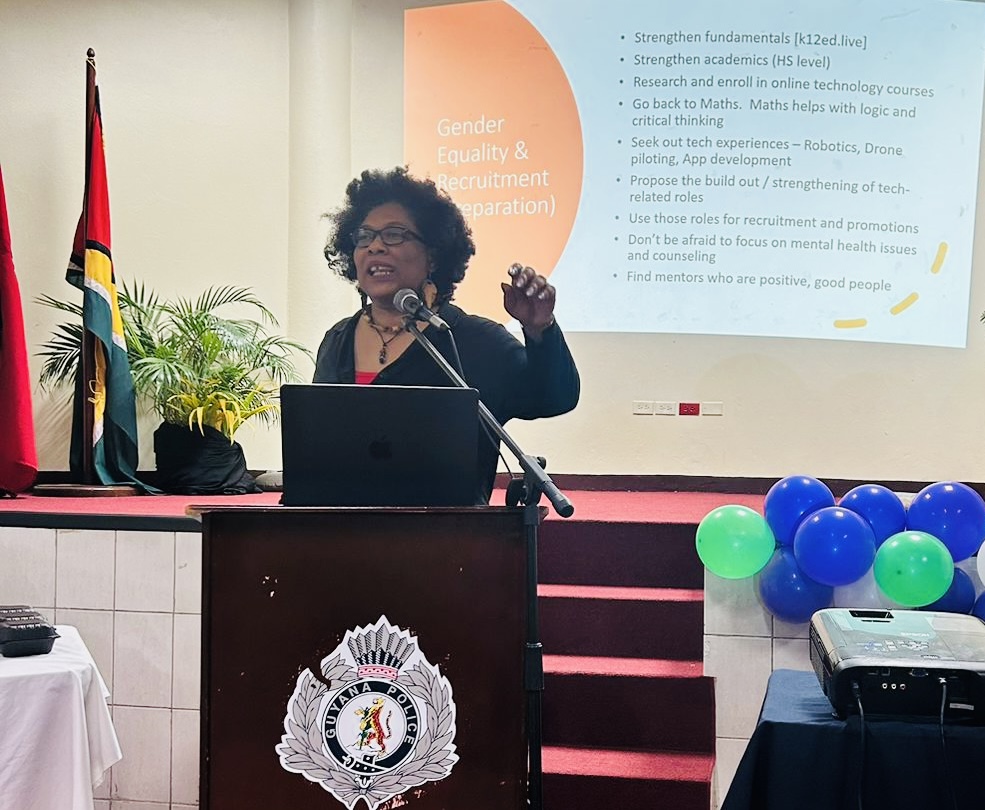At the Women in Law Enforcement Summit, Karen Abrams, the Director of STEMGuyana, delivered a compelling presentation on “Emerging Trends & Innovations in Law Enforcement,” which was met with enthusiastic reception and an engaging Q&A session. Abrams, known for her extensive background in business, technology, and education, including a successful tenure as Director of Operations at Internet Service Provider, Earthlink, shared her insights on the intersection of technology and law enforcement, emphasizing the pivotal role of STEM (Science, Technology, Engineering, and Mathematics) in modern policing strategies.
STEMGuyana, as described by Abrams, is a premier after-school program dedicated to inspiring the next generation of Guyanese innovators through a variety of initiatives, including robotics, app development, and drone soccer. Abrams’ presentation underscored the importance of such programs in preparing individuals for careers in tech-driven fields, including law enforcement. “Programs like ours fill the pipeline of students so that more students with an interest in STEM make it to the tertiary levels of education”, Abrams said.
The courses offered by STEMGuyana, ranging from introductory robotics and coding to advanced topics like artificial intelligence and biotechnology, highlight the diverse skill sets that are becoming increasingly relevant in law enforcement. Abrams’ history with law enforcement technology, including the development of applications like CRIMEBUSTERS, FIVE-O, and WATCHDOG, showcases her direct involvement in integrating technology into public safety and community policing efforts.
One of the standout features of Abrams’ presentation was the WATCHDOG app, a multifaceted tool designed for the Guyanese context, enabling citizens to report suspicious activities, view traffic updates, and even report police interactions. This app represents a significant step towards enhancing community involvement and transparency in law enforcement.
Abrams also touched upon the broader implications of technology in advancing gender equality within law enforcement. Citing the example of New York Deputy Police Commissioner Tania Kinsella, Abrams highlighted the achievements of women who have broken barriers in the field, advocating for more inclusive and diverse law enforcement agencies.
The presentation delved into the concepts of predictive policing, community involvement using technology, and the integration of advanced tools like drones and digital forensic software. Abrams emphasized the need for law enforcement personnel to be well-versed in technology, from understanding the basics of AI and data analytics to being comfortable with digital communication tools like social media and WhatsApp.
A significant portion of Abrams’ talk was dedicated to preparing for 21st-century policing, where technology plays a central role. She offered practical advice for individuals looking to enter or advance in law enforcement, such as strengthening fundamental skills in math and science, seeking out tech experiences, and focusing on mental health and well-being.
Karen Abrams’ presentation at the Women in Law Enforcement Summit shed light on the transformative potential of technology in policing. She also called for a concerted effort to recruit and promote women within the field. Her message was clear, embrace technology and foster diversity as these are key to building more effective, equitable, and community-focused law enforcement agencies.
